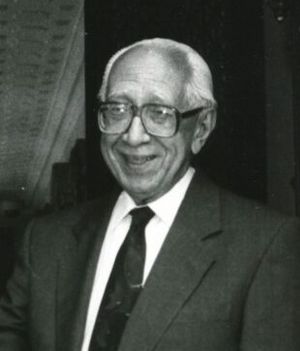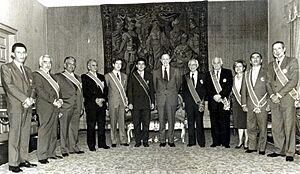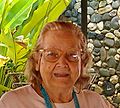Ramón José Velásquez facts for kids
Quick facts for kids
Ramón J. Velásquez
|
|
|---|---|

Ramón J. Velásquez in 1993
|
|
| President of Venezuela | |
| In office 5 June 1993 – 2 February 1994 |
|
| Preceded by | Octavio Lepage (acting) |
| Succeeded by | Rafael Caldera |
| Minister of Communications of Venezuela | |
| In office 1969–1971 |
|
| Secretary of the Presidency of Venezuela | |
| In office 1959–1963 |
|
| Succeeded by | Manuel Mantilla |
| Personal details | |
| Born | 28 November 1916 San Juan de Colón, Táchira, Venezuela |
| Died | 24 June 2014 (aged 97) Caracas, Venezuela |
| Spouse |
Ligia Betancourt Mariño
(m. 1948; died 2008) |
| Alma mater | Central University of Venezuela |
| Signature | |
Ramón José Velásquez Mujica (born November 28, 1916 – died June 24, 2014) was an important Venezuelan leader. He was a politician, a historian, a journalist, and a lawyer. He served as the President of Venezuela for a short time, from 1993 to 1994.
Contents
Early Life and Education
Ramón Velásquez was born in Táchira in November 1916. His father, Ramon Velasquez Ordoñez, was a journalist and teacher. His mother was Regina Mujica. Ramón was taught at home by his parents when he was young. He finished his primary school in San Cristóbal.
In 1935, he moved to Caracas to finish high school. He then went to the Central University of Venezuela. He earned a PhD in social and political sciences in 1942. The next year, in 1943, he also earned a law degree.
A Life in Words: Ramón Velásquez as a Writer
Ramón Velásquez started his career as a reporter in 1941. He worked for a newspaper called Últimas Noticias.
He later became the president of another well-known newspaper, El Nacional, twice. He held this role from 1964 to 1968 and again from 1979 to 1981.
Velásquez wrote many books about Venezuela's political history. People thought he was Venezuela's most important historian during his lifetime. He was also the President of the National Academy of History.
Serving His Country: Ramón Velásquez as a Statesman
During the time when Marcos Pérez Jiménez was a dictator, Ramón Velásquez was put in jail for a year. This was because he helped put together a book called Libro negro de la dictadura (Black book of dictatorship). This book helped show the bad things that happened during the dictatorship.
In 1958, Venezuela became a democracy again. Velásquez was elected to the Venezuelan Senate for his home state of Táchira. Later, he was elected to the Venezuelan Chamber of Deputies for the state of Miranda.
He worked as the Secretary General of the Presidency for President Rómulo Betancourt. After that, he was part of the National Congress. He also served as the Minister of Communications from 1969 to 1971 under President Rafael Caldera.
From 1984 to 1987, he led a group called the Commission on the Reform of the State (COPRE). This group worked on making changes to how the government worked. Between 1989 and 1993, he led a special group that looked at border issues with Colombia (COPAF).
President of Venezuela
In 1993, Venezuela faced a difficult time. The previous president, Carlos Andrés Pérez, was removed from office. Because Ramón Velásquez was a respected national figure, the Congress chose him to be the new President. He served from June 5, 1993, to February 2, 1994.
During his time as president, he had to deal with some big challenges. In August 1993, Tropical Storm Bret caused a lot of damage. It led to many deaths and mudslides in Caracas. About 1,400 workers and volunteers, along with the Red Cross and firefighters, helped with rescue efforts. People who lost their homes were temporarily housed at an army base.
His government also introduced the Value Added Tax (VAT). This was a new tax on goods and services.
Later Life and Legacy
In 1948, Ramón José Velásquez married Ligia Betancourt Mariño. She was the First Lady of Venezuela from 1993 to 1994. She passed away in 2008.
Ramón Velásquez died on June 24, 2014, at the age of 97. He passed away from natural causes.
He received many awards and honors throughout his life. These include:
- The Maria Moors Cabot prize in 1967, for his work in journalism.
- Becoming a member of the National Academy of History of Venezuela in 1968.
- The National Prize for Literature in 1973, for his book La caída del liberalismo amarillo.
- Honorary doctorates from several universities in Venezuela.
Images for kids
See also
- List of Venezuelans
- In Spanish: Ramón José Velásquez para niños



